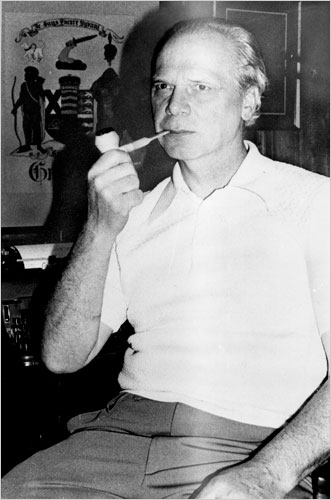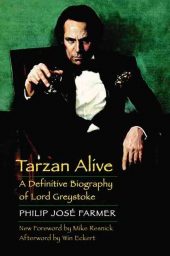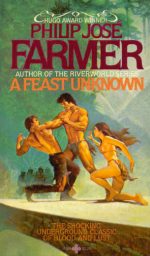Son of the Pulps: Philip Jose Farmer, Part 1
Saturday , 3, June 2017 Appendix N, Authors, Fiction, Short Fiction 4 Comments It’s often been asked what later science fiction writers the pulp masters influenced. I wager there were many, even when it’s not directly obvious from the works themselves. For instance, the adventurousness of Heinlein’s stories and his classic heroes remind me strongly of the best pulp authors.
It’s often been asked what later science fiction writers the pulp masters influenced. I wager there were many, even when it’s not directly obvious from the works themselves. For instance, the adventurousness of Heinlein’s stories and his classic heroes remind me strongly of the best pulp authors.
But speculation aside, of all the great science fiction authors, Philip Jose Farmer was unquestionably influenced the most. Best known for his Riverworld series, Farmer’s works possess a boundless enthusiasm for adventure and the type of resourceful, powerful heroes the pulps were filled with. There is no question what inspired him, either, as Tarzan was Farmer’s favorite fictional character. To that end, Farmer wrote a number of outstanding Tarzan pastiches in the 1970’s as well as an official Tarzan novel, The Dark Heart of Time (1999), near the end of his career.
This was not enough for Farmer. He also wrote Tarzan Alive, a meticulous biography of the wild man’s life and ancestry where he introduced the Wold Newton family, linking Tarzan to dozens of fictional characters, many from the pulps, including Sherlock Holmes, Bulldog Drummond, The Shadow, Sam Spade, Nayland Smith of Dr. Fu-Manchu fame, James Bond, Captain Blood, and even…Mr. Darcy and Elizabeth Bennett. One part of the book describes an interview Farmer himself conducted with the legendary Lord Greystoke. And thanks to Youtube, we can see Farmer discussing that experience in an obscure documentary. One can feel the man’s genuine passion.

Best facial depiction of Tarzan in cover art history?
There will be far more to say about Farmer’s versions of Tarzan and how they contrast with Burroughs’ original in a future installment, but suffice for now that he brilliantly captured the limitless imagination and high adventure that is the character at his best.
Farmer’s second favorite pulp hero was Doc Savage, who he also devoted several works to. A favorite pastime of Farmer was getting these characters to interact, and in his series Empire of the Nine, a version of Tarzan and of Savage do precisely that. I highly recommend it.
In general, Farmer wrote a unique blend of science fiction, fantasy, and pulp. However, he also wrote at least one purely pulp novel, Nothing Burns in Hell (1998). Released when Farmer was 80, it’s not among his best works, but is still a decent hard-boiled crime story that fans of Chandler, Hammett, and Cain will especially enjoy.
The influence of specific pulp authors on Farmer is seen in more nuanced ways, too. Among his early works is They Twinkled Like Jewels, a short story set in a dystopian future. A drifter is simultaneously haunted and mesmerized by an event from childhood. The tension builds throughout, leading to a horrifying, gruesome, and evil ending featuring a monstrous entity.
It’s a shocking, wonderfully effective science fiction horror story by an author not known for them. It strongly reminds me of Lovecraft, from the gradual rise of tension, the nihilistic worldview (unheard of in Farmer’s later stories), to the memorable finale that reveals the grotesque antagonists in all their hideousness. While likely experimental, as he didn’t go back to the genre, it demonstrates that Farmer appreciated and learned a lot from Lovecraft.

The cover is substantially tamer than anything within the actual book.
Another revealing short story is Spiders of the Purple Mage, an adventure set in Egypt filled with magical amulets, assassins, and evil wizards. All written with Farmer’s distinct humor, maturity, intelligence, and excitement. The exotic nature of the work and imagery seems a clear homage to our favorite pulp Orientalist and budding mystic, Sax Rohmer, as well as the Conan tales of Robert E. Howard. It could easily have appeared in Weird Tales alongside the originals.
Farmer was a bibliophile, and drew inspiration from myriad sources, including history and myth. However, the pulps were a particularly salient influence that comes up in his stories time and again. He wouldn’t have been the same author without them.
As one may have guessed, this is meant to be an overview of Farmer’s career with regards to the pulps. Next time, we will look closely at the differences between Farmer’s various versions of Tarzan versus the Burroughs original.
Tarzan’s name was not Greystoke, that’s how you know PJF made up the whole interview! He’s a fraud!
Tried to read the sample of Feast Unknown after seeing this article, but within those first few pages he had already talked about rape, masturbation, sodomy, and vividly described genitalia.
If we are going to call out Neil Gaiman for his tastelessness, Farmer will be noted as equally awful.
Story seems fun though, and the writing is A+ from what I can tell. Shame that all that nastiness is strewn about it.